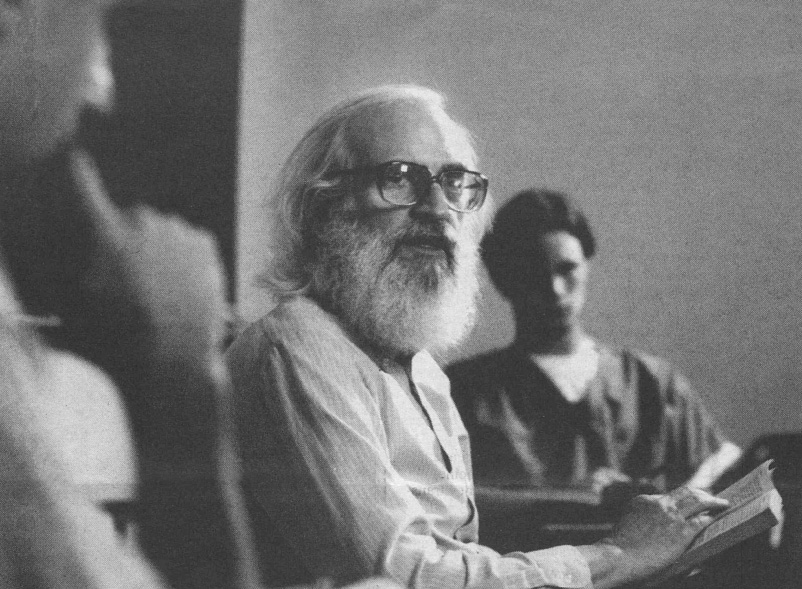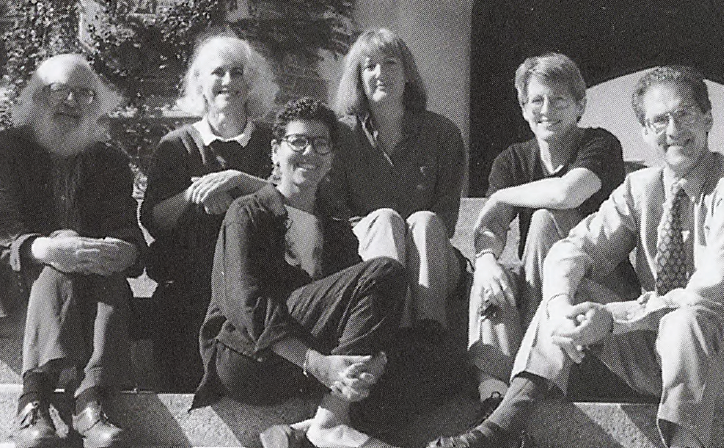By Ginger O’Donnell | July 30, 2025
Paul Eykamp, AB ’87, enrolled in WashU’s famous “Bible As Literature” course — taught by the legendary David Hadas, an English and religious studies professor for nearly 40 years in Arts & Sciences — based on word of mouth. “Everybody said, ‘If you’re going to take one elective English class, you want to take this one,’” he recalls, adding, “And it’s still the class everyone talks about.”

Indeed, in a 2024 WashU Alumni Facebook poll, roughly 33 respondents cited Hadas’ English class when asked about their all-time favorite WashU course, and for many, it changed their lives. “He made a community out of issues we had thought to be too personal for the intellect to shine,” Professor David Lawton said of Hadas in his university obituary, following the beloved educator’s death in March 2004 from colon cancer.
Eykamp, a double-major in economics and political science with broad, interdisciplinary interests, entered the course with a strong working knowledge of the Bible. But he was engaged in unexpected ways by Hadas’ fresh take on the hefty work from a purely literary perspective. “You had to disentangle everything you thought you knew and go, ‘OK, what’s going on here?’” he remembers.
Such disentanglement was performed with an irreverent attitude. Eykamp still laughs out loud at a running class joke about the Book of Job and its repeated, humorous mention of the phrase “and much cattle,” though he can’t quite place the passage or the context. It doesn’t matter — it’s his vivid impression of community and humor and, above all, rigorous debate, that illuminate the “Bible As Literature” in his memory.
“There were half a dozen WashU professors that were just fun to be in lecture with. Hadas was one of them. Those are the courses I remember.”
Paul Eykamp, AB ’87
Arts & Sciences alumna Julie Lehrman, AB ’93, a French and comparative literature major, underscores the authentic critical dialogue that characterized each class meeting — which always invited engagement despite being held in a large auditorium, she says. “People’s hands were always up. Somebody would throw something out, and he would challenge it or invite other people to challenge it. He was a real critical thinker. Even if he agreed with your position, he would take the opposite view just to hear how well you argued your point.”
For both Eykamp and Lehrman, Hadas’ teaching and mentorship influenced their lives and careers beyond WashU’s campus. Eykamp, who is now a data scientist for a large motor club serving wide swaths of the American West, would go on to teach writing and historical survey courses at the University of California San Diego, where he earned his master’s degree and doctorate. Hadas was his model, embodying the ideal mix of penetrating Socratic questioning and lightheartedness. “I didn’t ever expect to teach writing, but that’s what I did, and Hadas gave me this whole toolkit,” Eykamp reflects.

Lehrman, meanwhile, a Chicago-based attorney recruiter with North Star Attorney Search LLC, credits Hadas with shepherding her through the writing process for her first major college research paper as part of the “Bible As Literature.” Having built that relationship, he later wrote a letter of recommendation for her application to law school.
Today, at a moment in time when critical dialogue has never been more important to combatting ideological polarization and bridging social divides, Lehrman cherishes the opportunities she had at WashU to expand and enrich her thinking about the Bible and beyond. She urges today’s students to do the same.
“It’s really important that we don’t just accept what’s given to us,” she says. “Don’t be afraid to challenge yourself and the beliefs you hold. That’s a big part of what college is about. Discovering what you believe — and discovering who you are.”
Eykamp, for his part, has a straightforward tip: Go ahead and take that class everyone is talking about, and have fun; you won’t regret it. “There were half a dozen WashU professors that were just fun to be in lecture with,” he says. “Hadas was one of them. Those are the courses I remember.”
Related Stories
Alumni share their favorite WashU class
Bears recall cherished memories and profound lessons from WashU classrooms and professors.
A one-way ticket to fascinating conversations
If you could take a one-way trip to anywhere, where would you go? Steven Shalowitz, AB ’86, has posed this question to more than 300 people on his podcast.